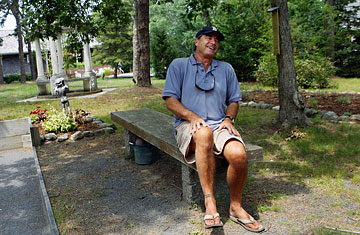
Author Paul Theroux pictured in his backyard in East Sandwich, Massachusetts, on July 31, 2008
Clad in white linen and a flowery shirt, Paul Theroux looked a picture of contentment during a recent speechmaking swing through Bangkok. Two Polynesian-style tattoos designed by the 68-year-old himself curved from an exposed wrist and sockless calve. Holding court within the quaintly colonial Authors' Wing of Bangkok's Oriental Hotel, the inveterate travel writer and novelist came off less like some haughty descendant of Conrad or Maugham and more an enthusiastic traveling salesman on a first tour of the exotic East.
Writers are often quite different in the flesh than in their books. And, on the eve of the release of Theroux's 47th, it was striking how much an author frequently chastised for snide condescension toward numerous realms and races appeared genuinely genial and warm-hearted. Was this really the same man taken to task for stereotyping Chinese train companions as venal, and writing of Africans that "the best of them are bare-assed"?
With his latest novel, A Dead Hand: A Crime in Calcutta(available internationally with American release slated for early next year), the New England-bred author builds on his distinction as the contemporary writer most responsible for the West's vision of Asia. By staying low to the ground (mostly by rail) and true to his raw, first impressions — masterfully bending the dullest of travel encounters into revelations — he has etched indelible snapshots of much of the globe. His 1973 Saint Jack evoked Singapore in the swinging days before its turn toward a more staid Yuppiedom; Kowloon Tong captured the 1997 Hong Kong handover through the petty business deals and shared secrets of Chinese and interlopers. In both Riding the Iron Rooster and Sailing Through China, he made strong claims as a China hand — though he now has as little good to say about the materialism of the Middle Kingdom.
In person and on the page, Theroux displays his biases as proudly as his passport stamps. It is places, not people, that always seem to resonate for him more deeply — as in A Dead Hand, where "the stew of Calcutta," as he puts it, overpowers all other subjects. "The cracks showing through the peeling paint, the dirty shutters, the windows opaque with dust, the dead bulbs, the flickering neon, the wobbling rickshaws and beat-up taxis, all like a dream of failure, reflected just how I felt about myself," he writes, in a vintage Theroux description that doesn't quite seem plausible when applied to protagonist Jerry Delfont, who suffers from the metaphoric "dead hand" of writer's block.
Given the real author's prolific output, the premise hardly seems plausible. As the story line plods through various seedy revelations about India, what really brings it to life are various musings about travel writing that only Theroux — not his stumbling altar-ego, Delfont — could have come up with. "I would never have lived in this wandering way," the author confesses, "if the pleasures had not outweighed the difficulties ... I hadn't chosen my life out of a desire to confront danger but rather because I was lazy and evasive, ducking out or moving on whenever I felt like it." And he seems to endorse the host of critics who agree that "as an outsider, the traveling writer sees only surfaces."
Yet Theroux makes a passionate defense of his genre when asked what role travel writing can play in a globalized world where much that was exotic seems increasingly like one giant 7-11 franchise. "That's just an illusion," Theroux claims, "because the customs, obligations, pieties that govern the people in that 7-11 can still be completely different." He still believes there's a wide field to be discovered in "dangerous places, war zones ridden with crime or plagues or terror." And he insists "the travel book should give the lie to those who think they can find everything on the Internet." It provides, in Theroux's words, "a future data base of the textures, the smell, the heat" that can never be found on "a one-dimensional screen."
That depth of feeling can still be found in A Dead Hand, with its farewell to one more Asian destination set "adrift in the greasy current with the flotsam of old fruit, rotting coconuts, curls of plastic and, sliding like scum from the ghats upriver, the buoyant ashes of human remains." Theroux pulls few punches and his authorial hand, like his wandering eye, seems far from stilled.
